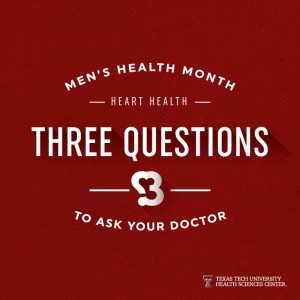A Heart-to-Heart Talk

Every day men may worry about their jobs, relationships or their children. For the most part getting to their doctor to see about their health may be the last thing on their mind. But Scott Shurmur, M.D., a cardiologist at the Texas Tech Physicians Center for Cardiovascular Health, said not only is it important to make time to see your doctor but make sure you are asking the important questions for your heart health.
“If you can find out what your risks are for a heart attack or stroke are, you can act accordingly,” Shurmur said.
Five top questions to ask your physician are:
1. Have you calculated my 10-year risk of heart attack or stroke?
Shurmur suggests an app that estimates your 10-year risk for heart attack and stroke called the atherosclerotic cardiovascular disease (ASCVD) Risk Estimator App. The handy app for iPhones and Androids can calculate the 10-year risk for heart attack and stroke for any man ages 40 to 79 by using some simple parameters such as age, gender, blood pressure, cholesterol, ethnicity, smoking and diabetes status. The National Heart, Lung and Blood Institute stated that if you are overweight, just by losing 5 to 10 percent of your current weight, you can lower your risk of coronary heart disease. By minimizing controllable risks, your heart health can improve.
2. Should I be on Statins?
Shurmur said those with a risk 7.5 10-year risk should be on statin therapy.
“If your physician puts you on a statin, don’t be discouraged,” Shurmur said. “Statins are medications that can help lower your cholesterol and are an important factor in preventing a heart attack and stroke.”
3. Do I have diabetes or am I at risk for diabetes?
Often a doctor can tell from fasting blood sugar levels, family history of diabetes, what your cholesterol profile looks like. Simple steps like dietary measures, exercising 150 minutes per week can prevent diabetes. This is important to note for your heart because having diabetes gives you about the same risk of heart attack as if you already had one. “Having diabetes is like already having blocked arteries in terms of your risk of having a heart attack over the next 7years,” Shurmur said.
Related Stories
Celebrating Veterans: TTUHSC’s General Martin Clay’s Legacy of Service and Leadership
From his initial enlistment in the Army National Guard 36 years ago to his leadership in military and civilian health care management roles, Major General Martin Clay’s career has been shaped by adaptability, mission focus and service to others.
Texas Tech University Health Sciences Center School of Nursing Named Best Accelerated Bachelor of Science in Nursing Program in Texas
The TTUHSC School of Nursing Accelerated Bachelor of Science in Nursing (BSN) program has been ranked the No. 1 accelerated nursing program in Texas by RegisteredNursing.org.
TTUHSC Names New Regional Dean for the School of Nursing
Louise Rice, DNP, RN, has been named regional dean of the TTUHSC School of Nursing on the Amarillo campus.
Recent Stories
National Academy of Inventors Names TTUHSC Faculty Senior Members
The National Academy of Inventors (NAI) has designated two current and one former TTUHSC faculty researchers as Senior Members.
The John Wayne Cancer Foundation Surgical Oncology Fellowship Program at Texas Tech University Health Sciences Center Announced
TTUHSC is collaborating with the John Wayne Cancer Foundation and has established the Big Cure Endowment, which supports the university’s efforts to reduce cancer incidence and increase survivability of people in rural and underserved areas.
TTUHSC Receives $1 Million Gift from Amarillo National Bank to Expand and Enhance Pediatric Care in the Panhandle
TTUHSC School of Medicine leaders accepted a $1 million philanthropic gift from Amarillo National Bank on Tuesday (Feb. 10), marking a transformational investment in pediatric care for the Texas Panhandle.
